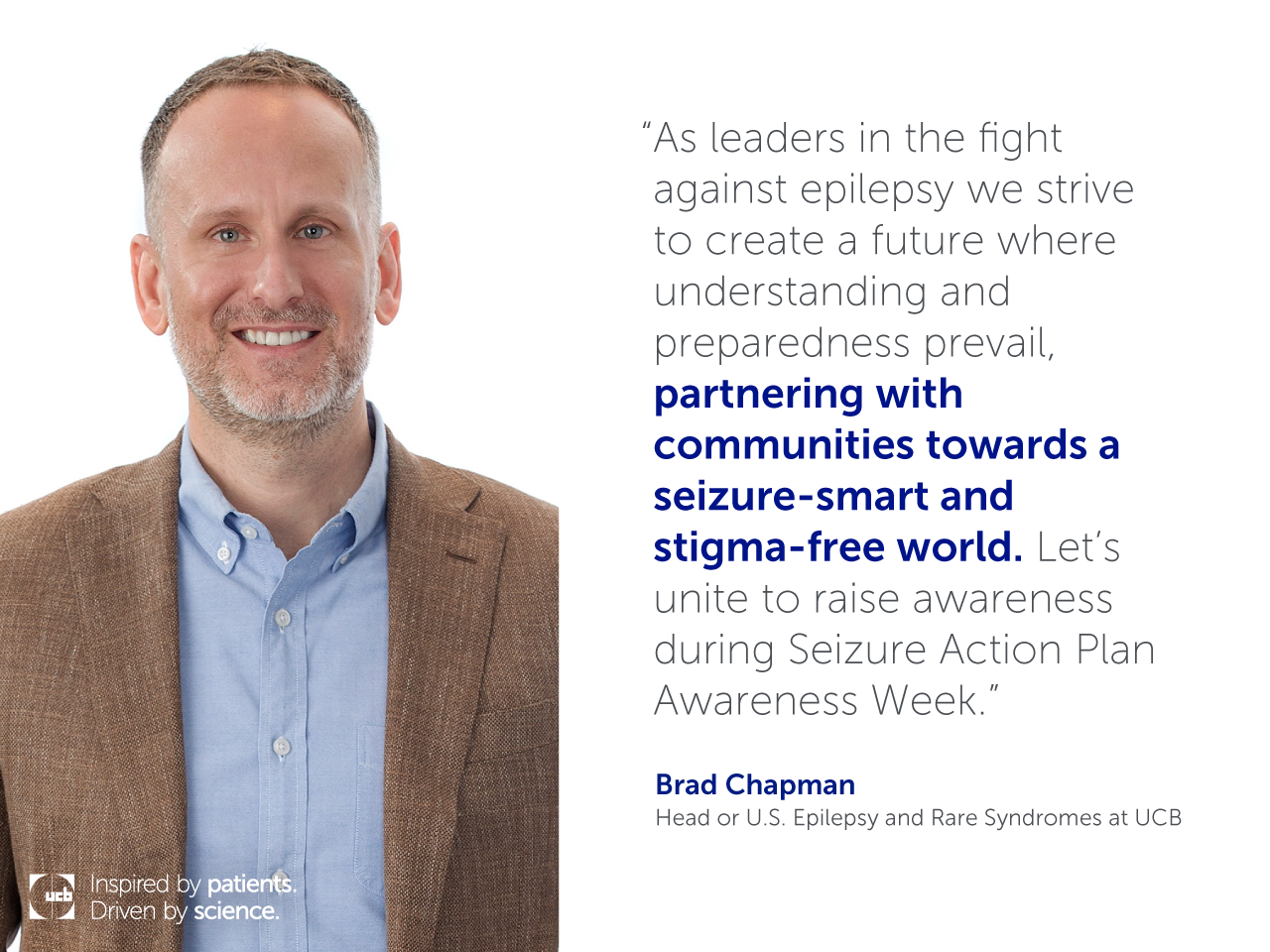
At UCB, we have been committed to people living with and caring for those with epilepsy and rare syndromes for three decades. We understand the challenges and uncertainties that they face every day, and we strive to provide solutions that can improve their quality of life and help them achieve their goals. We partner with patients and caregivers throughout their care journey, from diagnosis to treatment to support. We also collaborate across the ecosystem to advance the science and practice of epilepsy care.
In the realm of healthcare, awareness is a powerful tool that can bring about positive change and save lives. Seizure Action Plan Awareness Week, occurring each year in February, is a time to shed light on the vital importance of having a comprehensive action plan in place for managing seizure clusters. However, it goes beyond raising awareness; it's about empowering patients, caregivers and healthcare professionals (HCPs) with the knowledge they need to navigate through these challenging situations. UCB is proud to be a part of several critical initiatives that are making a significant impact to move the needle for the communities we serve.
ASCP's Management Protocol
The American Society of Consultant Pharmacists (ASCP) recently released a management protocol specifically designed for seizure clusters in non-hospitalized older adults and adolescents/adults with intellectual and developmental disabilities (IDD). Founded in 1969, ASCP is a distinguished international association comprising pharmacies and pharmacists dedicated to managing the medications of the elderly and medically complex.
This protocol, established by support from UCB, plays a pivotal role in educating ASCP members working with long-term care (LTC) residents and those with IDD. It emphasizes the necessity of checking and treating patients in these settings for seizure clusters. The protocol provides invaluable insights into identifying potential seizure clusters, the importance of a seizure action plan (SAP), and guidelines on treating seizure clusters with rescue medications. Clinicians also benefit from expert panel considerations, ensuring a patient centered approach to seizure management.
Key Components of a Seizure Action Plan:
- Identification of Potential Clusters: The first step is recognizing signs that may indicate an impending seizure cluster. This involves close monitoring and awareness of the patient's unique indicators.
- Need for a Seizure Action Plan: ASCP's protocol underscores the necessity of having a well-defined seizure action plan in place. This includes detailing the patient's medical history, specific seizure triggers, and recommended response actions.
- Treatment with Rescue Medications: The protocol provides insights into the proper administration of rescue medications, ensuring that healthcare professionals and caregivers are well-equipped to handle seizure clusters promptly and efficiently.
- Expert Panel Considerations: ASCP, through its protocol, brings together expert opinions to guide clinicians in making informed decisions about the management of seizure clusters, further ensuring a holistic approach to patient care.
SAP Coalition Resources
Our commitment to seizure action plans extends beyond protocols. We proudly sponsor resources for the SAP Coalition. "United in our commitment to empowering individuals living with epilepsy and their caregivers, the Seizure Action Plan Coalition is grateful for the steadfast support from partners like UCB,” said Lisa Gallipoli, COO, Epilepsy Alliance America. “Together, we strive to raise awareness and promote the mission of creating comprehensive Seizure Action Plans, ensuring that individuals have the knowledge and tools to navigate their journey with confidence and resilience." These resources are instrumental in equipping patients, caregivers, and HCPs with the tools they need to navigate the complexities of seizure clusters effectively. Thus, reinforcing our dedication to empowering individuals with comprehensive seizure action plans.
UCB's Research in Epilepsy
We are also committed to our ongoing research in epilepsy, which was featured in a recent article in The Lancet1, a prestigious medical journal. The article highlighted the major advances in epilepsy research in 2023, including new therapies for rare and refractory epilepsy syndromes, novel biomarkers for seizure prediction and detection, and innovative devices for seizure monitoring and stimulation. Our research aims to contribute to these advances by developing new rescue medications that can offer more options for people with epilepsy who experience uncontrolled seizures. This recognition underscores our commitment to advancing the field of epilepsy research and highlights the impact of our efforts in shaping the future of seizure management.
At UCB, we are united in our commitment to empowering people living with and caring for those with epilepsy and rare syndromes to live their best lives. Through sponsorship of vital resources and UCB's pioneering research, we are collectively working towards a future where individuals facing seizures and seizure clusters can do so with more confidence and resilience. Together, we can make a difference, one action plan at a time. By understanding the importance of seizure action plans, both patients and healthcare professionals can work together to create a safer and more supportive environment. Through our continued research, education, and collaboration, we can strive towards a future with better outcomes and quality of life for the communities we serve.
References
- Hullett, P. W., & Lowenstein, D. H. (January, 2024). Major advances in epilepsy research in 2023. 2023 Round-Up, 23(1), 19-20. https://doi.org/10.1016/S1474-4422(23)00457-X
©2024 UCB, Inc., Smyrna, GA 30080. All rights reserved. US-DA-2400040